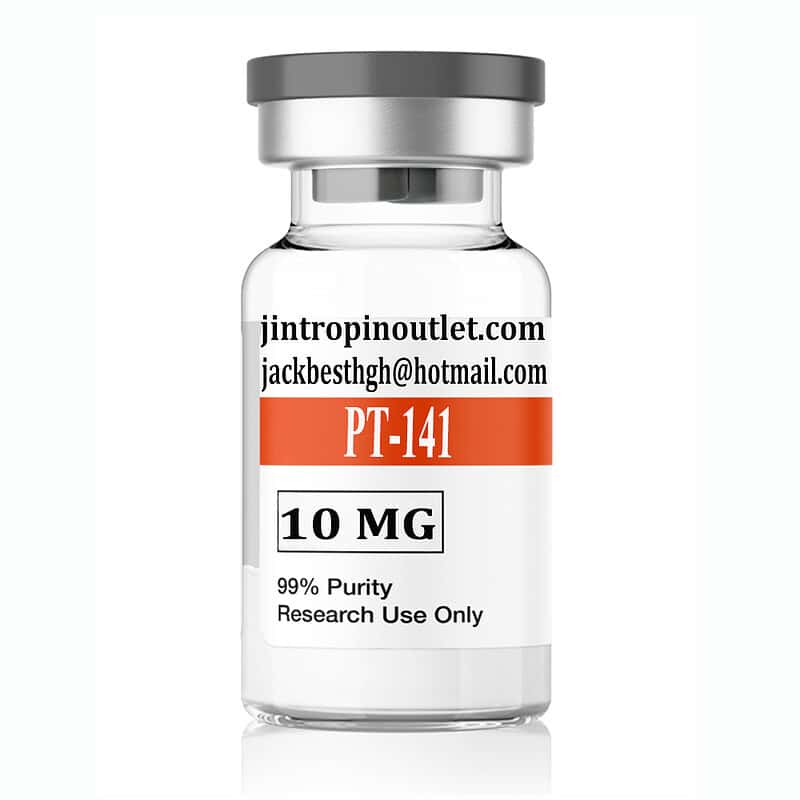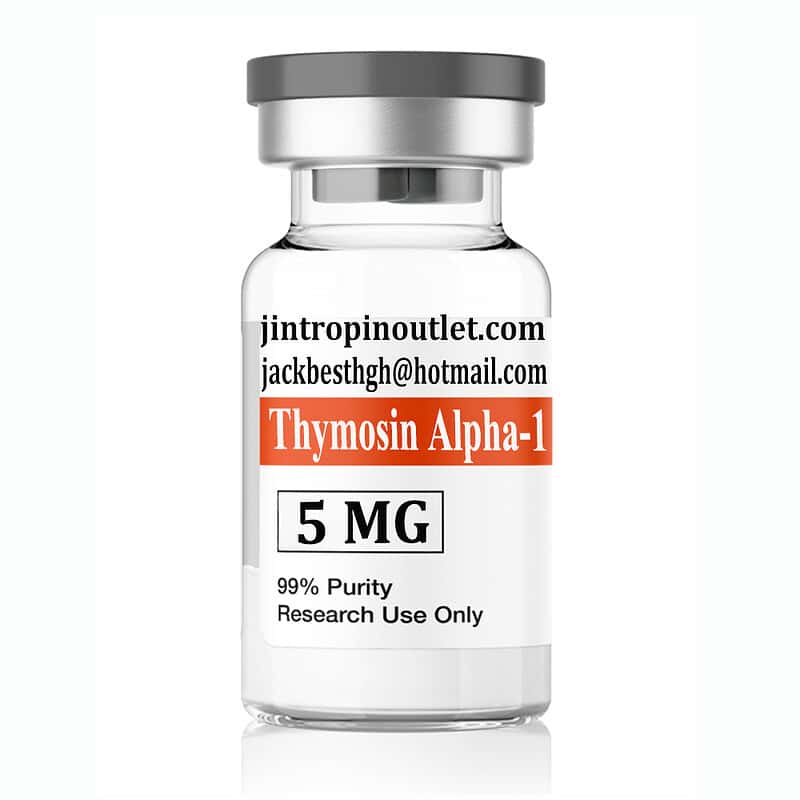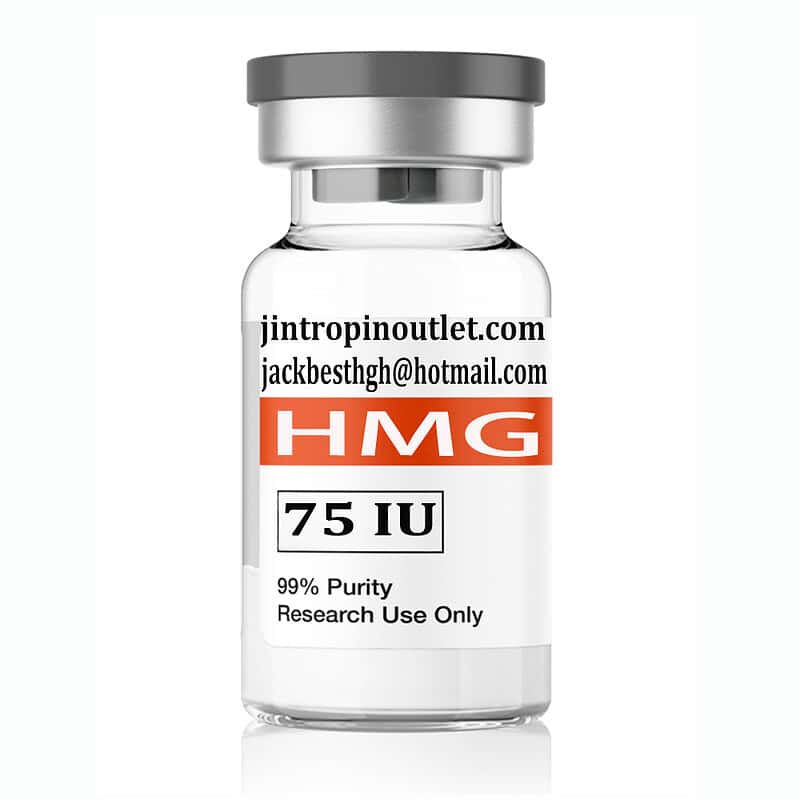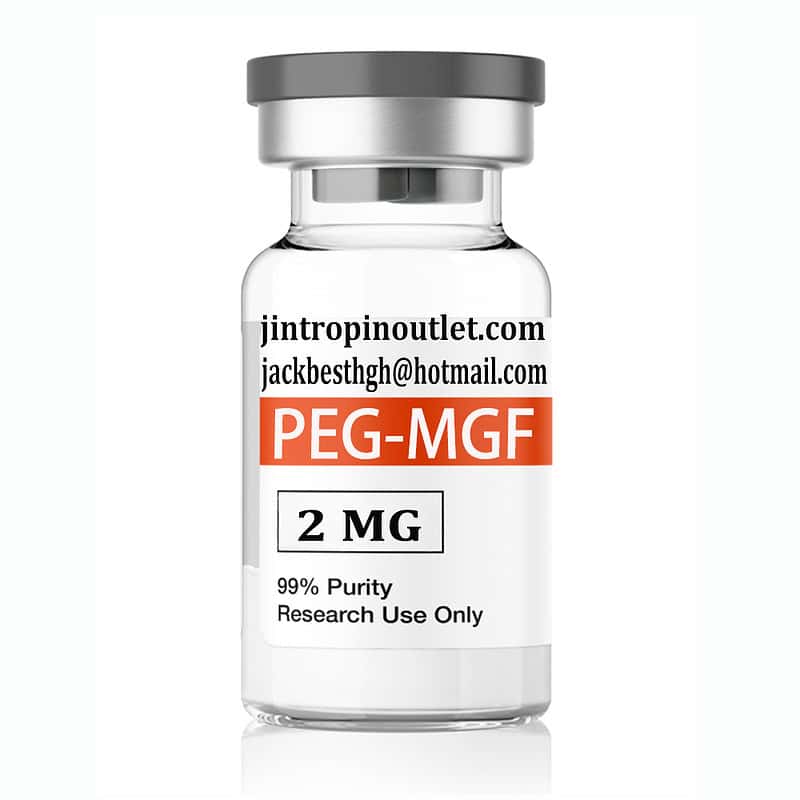Semaglutide 30mg Starter Program (GLP-1 Analogue) For Weight Loss 10vials
Original price was: $450.00.$300.00Current price is: $300.00.
Semaglutide has previously been hailed as a new and effective treatment for obesity, that has been shown to be just as effective at reducing body weight as certain weight loss surgeries.Semaglutide Injection is works by mimicking hormones that target areas of the brain involved in regulating appetite and food intake. This can help you eat less and lead to weight loss.Semaglutide is the best way for weight loss ,No side effect and gaining popularity quickly.
- Country of origin:
- Package :5mg * 10vials *1kits (50mg/box) ,No water included.
- Price: $30 — $50 per mg
- Minimum Order:2 vials ,5 vials or?1 kits
- Formula :C187H291N45O59
- CAS No. 910463-68-2(free base)
- Storage:2—8? in room temperature
- Delivery: 5-15 days
- Shipping :Room temperature shipping(Stability testing shows this product can be shipped without any cooling measures.)
- Payment: W.U,T.T,Paypal,BTC,USDT
100% delivery
- Satisfaction Guaranteed
- No Hassle Refunds
- Secure Payments
Description
More recently, Semaglutide has grown in popularity as an injectable weight-loss medication. The injection imitates GLP1 ?C a naturally occurring peptide in your body ?C which is released after you eat and signals to your brain that you are full. It also slows the rate at which the stomach empties after eating, which leads to feelings of fullness for longer.
Semaglutide is derived from the naturally occurring peptide GLP-1, which is known to lower blood sugar levels and boost insulin production. Semaglutide is a GLP-1 agonist and works by increasing insulin release, lowering the amount of glucagon released, delaying gastric emptying and reducing appetite.
Semaglutide injection is used to treat type 2 diabetes. It is used together with diet and exercise to help control your blood sugar. This medicine is also used to lower the risk of heart attack, stroke, or death in patients with type 2 diabetes and heart or blood vessel disease.
What Is Semaglutide?
Semaglutide peptide is a synthetic glucagon-like peptide-1 (GLP-1) analog. GLP-1 peptide is an endogenous peptide hormone containing 30 amino acids. The primary potential of this compound is to enhance insulin production, reduce blood sugar levels, and conserve the pancreatic beta cells by stimulating insulin gene transcription. Additionally, the compound delays apparent gastric emptying and hence may suppress appetite. GLP-1 appears to profounding affect the most critical organs, including the heart, kidney, lungs, and liver. Semaglutide, as a GLP-1 receptor agonist, may possibly reduce insulin levels and glucose, reduce appetite, and induce weight loss.
Semaglutide Effects or Medical uses
- Regulates Blood Sugar –Semaglutide is indicated as an adjunct to diet and exercise to improve glycemic control in adults with type 2 diabetes. Semaglutide is a glucagon-like peptide-1 receptor agonist. It increases the production of insulin, a hormone that lowers the blood sugar level.It also appears to enhance growth of ?? cells in the pancreas, which are the sites of insulin production. It also inhibits glucagon, which is a hormone that increases blood sugar.
- Weight loss Shuts Down Hunger Cues Whenever we eat food, the foods we??re eating actually activate the appetite centers in the brain. Under normal conditions, we??d feel full when we??re done eating. This happens due to the release of a gut hormone called GPL-1 that essentially shuts down the brain??s hunger cues. Some people don??t experience these cues because their bodies aren??t producing the levels of GPL-1 needed to make them feel full and satisfied. When semaglutide is injected, it mimics the GLP-1 hormone to affect the receptors that ??shut down?? feelings of hunger. That means that you??re experiencing complete fullness and satisfaction when either not eating or eating much less food than normal. Studies have found that taking semaglutide is associated with fewer food cravings, less hunger and better control of food intake. Taking semaglutide also results in a lower preference for high fat foods. For many people, using semaglutide weekly marks the end of cravings, frenzied eating, and constant feelings of hunger. may decrease appetite and cause weight loss.
Other uses for this medicine
This medication may be prescribed for other uses; ask your doctor or pharmacist for more information.
What are other name for semaglutide?
Semaglutide is primarily known by its generic name ??Semaglutide.?? However, it is also available under different brand names depending on the specific formulation and indication. Some of the brand names for semaglutide are: 1. Ozempic: Ozempic is the brand name for semaglutide used for the treatment of type 2 diabetes. It is available as a once-weekly subcutaneous injection. 2. Rybelsus: Rybelsus is the brand name for oral semaglutide. It is the first and currently the only oral GLP-1 receptor agonist approved for the treatment of type 2 diabetes. It??s important to note that the availability and brand names of medications can vary by country and region. Therefore, it??s always advisable to consult with healthcare professionals or refer to reputable sources specific to your region for accurate and up-to-date information on the brand names of semaglutide available in your area.
Semaglutide Side Effects
Get emergency medical help if you have signs of an allergic reaction: hives, itching; dizziness, fast heartbeats; difficult breathing; swelling of your face, lips, tongue, or throat. Serious side effects of semaglutide may include: call your doctor at once if you have:
- vision changes;
- unusual mood changes, thoughts about hurting yourself;
- pounding heartbeats or fluttering in your chest;
- a light-headed feeling, like you might pass out;
- signs of a thyroid tumor–swelling or a lump in your neck, trouble swallowing, a hoarse voice, feeling short of breath;
- symptoms of pancreatitis–severe pain in your upper stomach spreading to your back, nausea with or without vomiting, fast heart rate;
- gallbladder problems–upper stomach pain, fever, clay-colored stools, jaundice (yellowing of the skin or eyes);
- low blood sugar–headache, hunger, weakness, sweating, confusion, irritability, dizziness, fast heart rate, or feeling jittery;
- kidney problems–swelling, urinating less, feeling tired or short of breath; or
- stomach flu symptoms–stomach cramps, vomiting, loss of appetite, diarrhea (may be watery or bloody).
Common side effects of semaglutide may include:
- low blood sugar (in people with type 2 diabetes);
- upset stomach, heartburn, burping, gas, bloating;
- nausea, vomiting, stomach pain, loss of appetite;
- diarrhea, constipation;
- stomach flu symptoms;
- headache, dizziness, tiredness.
This is not a complete list of side effects and others may occur. Call your doctor for medical advice about side effects.
What special precautions should I follow Before Taking Semaglutide Injection?
- tell your doctor if you have or have ever had pancreatitis (inflammation of the pancreas), diabetic retinopathy (damage to the eyes caused by diabetes), gallbladder disease, or kidney disease. Also tell your doctor if you have recently had diarrhea, nausea, or vomiting or if you cannot drink liquids by mouth, which may cause dehydration (loss of a large amount of body fluids).
- tell your doctor if you plan to become pregnant. Your doctor may tell you to stop using semaglutide injection for 2 months before a planned pregnancy.
- tell your doctor if you are pregnant or are breastfeeding. If you become pregnant while using semaglutide injection, call your doctor.
- ask your doctor what to do if there is a large change in your diet, exercise, or weight; or if you get sick, develop an infection or fever, experience unusual stress, or are injured. These changes and conditions can affect your blood sugar and the amount of semaglutide injection you may need.
- tell your doctor and pharmacist if you are allergic to semaglutide, albiglutide (Tanzeum; no longer available in the US), dulaglutide (Trulicity), exenatide (Bydureon, Byetta), liraglutide (Saxenda, Victoza), lixisenatide (Adlyxin, in Soliqua), any other medications, or any of the ingredients in semaglutide injection. Ask your pharmacist or check the Medication Guide for a list of the ingredients.
- tell your doctor and pharmacist what prescription and nonprescription medications, vitamins, nutritional supplements, and herbal products you are taking or plan to take. It is especially important to tell your doctor about all the medications you take by mouth because semaglutide may change the way your body absorbs these medications.
- you should know that your mental health may change in unexpected ways and you may become suicidal (thinking about harming or killing yourself or planning or trying to do so) while you are using semaglutide injection for weight loss. You, your family, or your caregiver should call your doctor right away if you experience any of the following symptoms: depression; talking or thinking about wanting to hurt yourself or end your life; withdrawing from friends and family; preoccupation with death and dying; or any other unusual changes in behavior or mood. Be sure that your family or caregiver knows which symptoms may be serious so they can call the doctor if you are unable to seek treatment on your own.
What special precautions should I follow Before Taking Semaglutide Injection?
- tell your doctor if you have or have ever had pancreatitis (inflammation of the pancreas), diabetic retinopathy (damage to the eyes caused by diabetes), gallbladder disease, or kidney disease. Also tell your doctor if you have recently had diarrhea, nausea, or vomiting or if you cannot drink liquids by mouth, which may cause dehydration (loss of a large amount of body fluids).
- tell your doctor if you plan to become pregnant. Your doctor may tell you to stop using semaglutide injection for 2 months before a planned pregnancy.
- tell your doctor if you are pregnant or are breastfeeding. If you become pregnant while using semaglutide injection, call your doctor.
- ask your doctor what to do if there is a large change in your diet, exercise, or weight; or if you get sick, develop an infection or fever, experience unusual stress, or are injured. These changes and conditions can affect your blood sugar and the amount of semaglutide injection you may need.
- tell your doctor and pharmacist if you are allergic to semaglutide, albiglutide (Tanzeum; no longer available in the US), dulaglutide (Trulicity), exenatide (Bydureon, Byetta), liraglutide (Saxenda, Victoza), lixisenatide (Adlyxin, in Soliqua), any other medications, or any of the ingredients in semaglutide injection. Ask your pharmacist or check the Medication Guide for a list of the ingredients.
- tell your doctor and pharmacist what prescription and nonprescription medications, vitamins, nutritional supplements, and herbal products you are taking or plan to take. It is especially important to tell your doctor about all the medications you take by mouth because semaglutide may change the way your body absorbs these medications.
- you should know that your mental health may change in unexpected ways and you may become suicidal (thinking about harming or killing yourself or planning or trying to do so) while you are using semaglutide injection for weight loss. You, your family, or your caregiver should call your doctor right away if you experience any of the following symptoms: depression; talking or thinking about wanting to hurt yourself or end your life; withdrawing from friends and family; preoccupation with death and dying; or any other unusual changes in behavior or mood. Be sure that your family or caregiver knows which symptoms may be serious so they can call the doctor if you are unable to seek treatment on your own.
What Is Semaglutide Brand Product?
Wegovy, Ozempic, Rybelsus are the brand Semaglutide product,Each of the different brands of semaglutide (Wegovy, Ozempic, Rybelus) are FDA approved for different conditions.
How To Use Semaglutide?
Usual Adult Dose for Weight Loss
Initial Dose Escalation Schedule:
- Weeks 1 through 4: 0.25 mg subcutaneously once a week
- Weeks 5 through 8: 0.5 mg subcutaneously once a week
- Weeks 9 through 12: 1 mg subcutaneously once a week
- Weeks 13 through 16: 1.7 mg subcutaneously once a week
Maintenance Dose: Week 17 and onward: 2.4 mg subcutaneously once a week Dosing Considerations:
- If dose escalation is not tolerated, consider delaying dose escalation for 4 weeks
- If the maintenance dose of 2.4 mg once a week is not tolerated, the dose can be temporarily decreased to 1.7 mg once a week for a maximum of 4 weeks
- After 4 weeks, increase dose back to 2.4 mg once a week; discontinue therapy if the patient cannot tolerate the maintenance dose of 2.4 mg once a week
Comments:
- or patients with type 2 diabetes, blood glucose should be monitored at baseline and during treatment.
- This drug should not be coadministered with other semaglutide-containing products or with any other GLP-1 receptor agonist.
- The safety and effectiveness of using this drug in combination with other weight loss products have not been established.
- This drug has not been studied in patients with a history of pancreatitis.
Uses: As an adjunct to a reduced calorie diet and increased physical activity for chronic weight management in adults with an initial body mass index (BMI) of 30 kg/m2 or greater, OR 27 kg/m2 or greater in the presence of at least one weight-related comorbid condition such as hypertension, type 2 diabetes mellitus, or dyslipidemia.
What Should I Do If I Miss A Semaglutide Dose?
MISSED DOSE for TYPE 2 DIABETES:
- If a dose is missed, administer as soon as possible within 5 days after the missed dose; if more than 5 days have passed, skip the missed dose and administer the next dose on the regularly scheduled day, resume regular once a week dosing
- Day of weekly administration may be changed as long as the time between doses is greater than 48 hours
MISSED DOSE for WEIGHT LOSS:
- If 1 dose is missed and the next scheduled dose is more than 2 days away (48 hours), administer as soon as possible
- If one dose is missed and the next scheduled dose is less than 2 days away (48 hours), do not administer the dose.; resume dosing on the regularly scheduled day of the week
- If more than 2 consecutive doses are missed, resume dosing as scheduled or, reinitiate following the dose escalation schedule, which may reduce the occurrence of gastrointestinal symptoms associated with reinitiation of treatment
What happens if I overdose?
In case of overdose, If you take too much Semaglutide, call your healthcare provider or seek medical advice promptly. Information is also available online at Poison Help If the victim has collapsed, had a seizure, has trouble breathing, or can??t be awakened, immediately call emergency services.
Semaglutide Storage &Disposal
- Before dilution,Store Semaglutide in a refrigerator at 2??C to 8??C (36??F to 46??F) and avoid frozen.
- If needed, each single-dose pen or single-dose vial can be stored unrefrigerated at temperatures not to exceed 30?C (86?F) for up to 21 days.
- Do not freeze Semaglutide. Do not use Semaglutide if frozen.
- Store Semaglutide in the original carton to protect from light.
Semaglutide Summary
Semaglutide is a relatively new drug that has been shown to be just as effective at reducing body weight as certain weight loss surgeries. The drug??s effects were uncovered during a clinical trial led by Professor Rachel Batterham at University College London (UCL) to evaluate the efficacy of this drug in weight management.
Semaglutide Reviews
The study reported an average weight loss of around 2.4 stone or 15.3kg was lost in the group of participants taking the drug, while those receiving the placebo (dummy drug) only lost an average of 0.4 stone or 2.6kg.
Moreover, within the group taking Semaglutide, 75% of those in the Semaglutide group lost over 10% of their body weight and more than 30% lost over 20% of their body weight. The findings indicate that this may indeed represent a major breakthrough in improving the health of those living with obesity.





